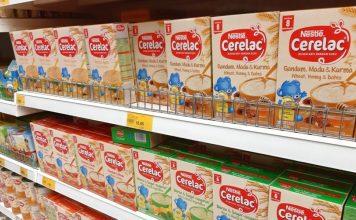Just a short while following the release of reports by a Swiss investigative group Public Eye and the International Baby Food Action Network alleging that Nestlé’s popular baby food brands in low- and middle-income nations contain elevated levels of added sugar, the National Agency for Food and Drug Administration and Control (NAFDAC) made a statement on Sunday asserting that infant formulas by the company purportedly containing sugar and honey are not approved for sale in Nigeria.
NAFDAC revealed this information through an official statement issued by its management.
According to WAKADAILY’s report, the findings by the Swiss investigative body accused Nestle of discrepancies in selling inferior baby food products with high sugar content in low-income African nations like Nigeria, Latin America, and Asia.
The report pointed out that while these products are sugar-free in Nestle’s home base of Switzerland and the UK, they contain notable levels of added sugar in other regions.
Public Eye and IBFAN examined about 150 products offered by Nestlé in lower-income countries and discovered that nearly all Cerelac infant cereals they scrutinized contained added sugar, averaging around 4 grams per serving – approximately equivalent to a sugar cube – despite being aimed at infants from six months old.
The highest sugar content discovered was 7.3 grams per serving in a product sold in the Philippines.
Moreover, the investigation found that many Nido powdered milk products for toddlers aged one to three years in lower-income countries also had added sugar, averaging almost two grams per serving, with the highest level (5.3 grams) found in a product sold in Panama.
In response to these findings, NAFDAC emphasized its commitment to ensuring that infant and young children foods in Nigeria meet established international food standards such as the Codex Alimentarius and Nigerian Industrial Standards, demonstrating the agency’s adherence to regulatory protocols in approving such products for distribution and consumption in the country.
It mentioned, “This is applicable to all categories of infant and young children foods distributed by manufacturers, importers, and marketers of infant and young children foods operating within Nigeria.
“Adequate, optimal nutrition during infancy and early childhood is essential to ensure the growth, health, and development of children to their full potential.
“The Codex Alimentarius Commission implements the Joint FAO/WHO Food Standards Programme, developing international food standards, guidelines, and codes of practice with the mandate to protect the health of consumers and ensure fair international food trade.
“Nigeria (NAFDAC) is an active participant in these international food standards-setting arenas to contribute to Nigeria’s positions during food standards development.
“Regarding the mention of Nido follow-up milk formula in the publication, NAFDAC wishes to state that the product is not registered in Nigeria, is not known to the agency, and is not in circulation in Nigeria.”
The National Agency for Food and Drug Administration and Control (NAFDAC) has indicated that the Nestle Cerelac infant cereals available in Nigeria have been officially approved by them according to the guidelines set by the Nigerian Industrial Standards (NIS) for Infant and Young Children Foods – specifically, Processed Cereal Based foods (NIS 256:2010) and the Codex Standard for Processed Cereal-based Foods for Infants and Young Children (CXS 74-1981).
These standards, which have been in place since 1981 and have undergone revisions and amendments over the years, along with the relevant NAFDAC regulations, ensure that the cereals meet safety, quality, and labeling requirements.
The regulations cover processed cereal-based foods designed for infants as complementary nutrition from the age of six months onwards.
They allow for the inclusion of certain sugars like sucrose, fructose, glucose, glucose syrup, or honey in cereal products intended to be consumed with milk or other suitable liquids, provided that the added carbohydrates from these sources do not exceed specified limits, such as 1.8 g/100 kJ (equivalent to 7.5 g/100 kcal).
Additionally, there are specific restrictions such as the maximum level of added fructose not exceeding 0.9g/100kJ (3.75g/100kcal).
In essence, NAFDAC’s response underscores that the Nestle Cerelac range for infants in Nigeria complies with the stipulated standards and regulations governing infant and young children’s food products, ensuring they meet the necessary safety, quality, and nutritional criteria.
“For cereals with an added high protein food, which are or have to be prepared for consumption with water or other appropriate protein-free liquid, carbohydrates (if sucrose, fructose, glucose, glucose syrup or honey) are added provided the amount of added carbohydrates from these sources shall not exceed 1.2 g/100 kJ (5g/100 kcal); and specifically the maximum level of added fructose shall not exceed 0.6g/100kJ (2.5g/100kcal).
“It is important to note that carbohydrates are made of building blocks of sugars and can be classified according to how many sugar units are combined in their molecule. Glucose, fructose, and galactose are examples of single-unit sugars, also known as monosaccharides. Double-unit sugars are called disaccharides, among which sucrose (table sugar) and lactose (milk sugar) are the most widely known.
“Infant and young children’s foods are strictly regulated by NAFDAC in recognition of the vulnerability of the target population and measures are in place to monitor and enforce compliance with the International Code of Marketing of Breast-milk Substitutes and the national regulations Marketing of Infant and Young Children Food and other Designated Products (Registration, Sales, etc.) Regulations,” it emphasized .
NAFDAC assured the public that infant and young children’s food available for purchase in Nigeria meet the required standards and regulations, ensuring their safety, quality, and overall wholesomeness.
